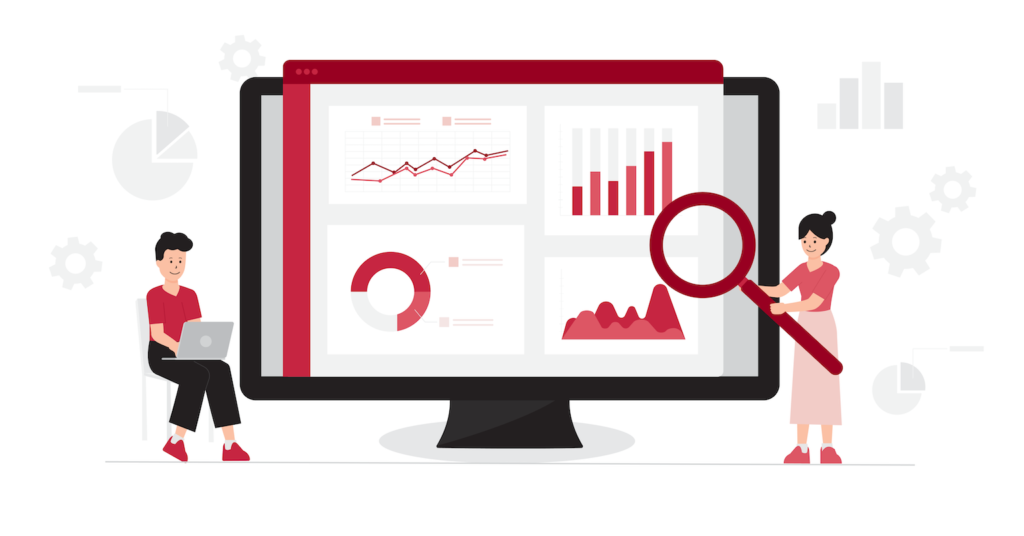In the ever-evolving landscape of digital marketing, staying ahead of the curve requires a data-driven approach. Marketing analytics dashboards play a pivotal role in empowering businesses to make informed decisions, optimize campaigns, and achieve greater ROI. In this article, we’ll explore the top 6 marketing analytics dashboard tools that are reshaping the way marketers visualize and analyze their data.
- Google Analytics: The Foundation of Web Analytics
Undoubtedly, Google Analytics stands as the bedrock of web analytics tools. It offers a comprehensive suite of features that empower marketers to track website traffic, user behavior, and conversion metrics. With an intuitive interface, Google Analytics allows users to create custom dashboards tailored to their specific needs. The platform seamlessly integrates with other Google products, such as Google Ads, providing a holistic view of online marketing efforts. Real-time reporting, audience segmentation, and e-commerce tracking are just a few of the robust features that make Google Analytics an indispensable tool for marketers.
- Tableau: Unleashing the Power of Data Visualization
Tableau has earned its reputation as a leading data visualization tool that transcends industries. Marketers can leverage Tableau to create visually stunning and interactive dashboards that transform raw data into actionable insights. With its drag-and-drop interface, Tableau enables users to connect to various data sources, including marketing platforms, databases, and spreadsheets. The tool’s ability to handle large datasets and provide real-time updates makes it a favorite among marketing professionals seeking to uncover patterns, trends, and correlations within their data.
- HubSpot Analytics: Aligning Marketing and Sales Efforts
HubSpot is renowned for its all-in-one marketing platform, and its analytics dashboard is no exception. HubSpot Analytics integrates seamlessly with HubSpot’s CRM, aligning marketing and sales efforts. The tool provides a unified view of customer interactions, lead generation, and conversion metrics. Marketers can track the performance of their email campaigns, social media efforts, and website traffic all in one place. The ability to create customizable reports and dashboards makes HubSpot Analytics a valuable asset for businesses looking to streamline their marketing and sales processes.
- Adobe Analytics: Elevating Customer Intelligence
Adobe Analytics is a robust solution that empowers marketers to dive deep into customer behavior and preferences. The platform’s advanced analytics capabilities go beyond basic website tracking, offering insights into customer journeys, segmentations, and conversion paths. With real-time reporting and predictive analytics, Adobe Analytics equips marketers with the tools to understand, anticipate, and respond to customer needs. Integration with other Adobe Marketing Cloud products enhances the overall marketing ecosystem, making it a preferred choice for enterprises seeking comprehensive customer intelligence.
- Kissmetrics: Unraveling Customer Insights for Growth
Kissmetrics is a customer analytics platform designed to help businesses understand and optimize customer engagement. Focused on customer-centric analytics, Kissmetrics provides insights into user behavior across different channels and touchpoints. Marketers can track the customer journey, identify conversion bottlenecks, and implement data-driven strategies to enhance user experience. Kissmetrics is particularly valuable for e-commerce businesses, as it offers detailed insights into shopping cart abandonment, product interactions, and customer lifetime value.
- Domo: Centralizing Business Intelligence
Domo positions itself as a business intelligence platform that goes beyond marketing analytics. It allows marketers to integrate data from various sources, providing a centralized hub for comprehensive business insights. Domo’s customizable dashboards enable users to create visual representations of their marketing performance alongside other key business metrics. Real-time data updates, collaboration features, and the ability to create alerts for critical KPIs make Domo a powerful tool for businesses aiming to streamline their decision-making processes.
Conclusion:
As the digital marketing landscape continues to evolve, the need for robust analytics tools becomes increasingly critical. The top 6 marketing analytics dashboard tools discussed in this article offer diverse features catering to the unique needs of marketers across different industries. Whether it’s the foundational web analytics of Google Analytics, the visual storytelling capabilities of Tableau, or the customer-centric approach of Kissmetrics, each tool brings its own strengths to the table.
Choosing the right marketing analytics dashboard tool depends on factors such as business size, specific objectives, and the depth of insights required. By embracing these tools, marketers can not only track their performance but also gain valuable insights that drive strategic decisions, optimize campaigns, and ultimately contribute to the overall success of their marketing efforts in an increasingly data-centric landscape.


